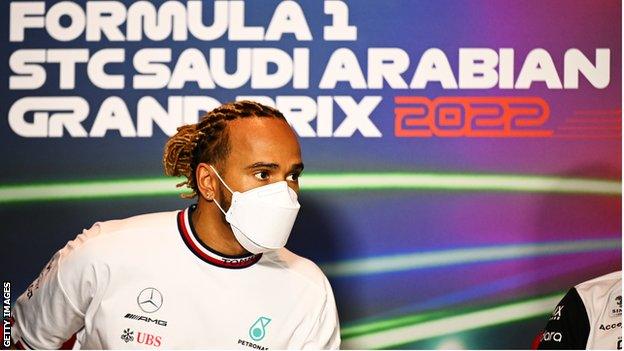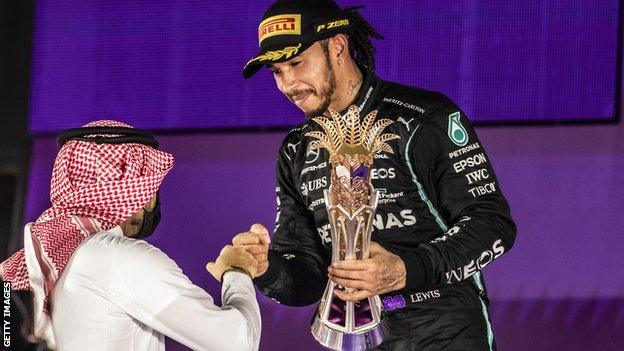Lewis Hamilton calls on Saudi Arabia to improve human rights record
- Published

Lewis Hamilton has previously said he is not comfortable racing in Saudi Arabia because of the country's human rights record
Lewis Hamilton says it should be "easy" for Saudi Arabia to make changes to improve human rights.
The country's record on human rights is in the spotlight on the eve of the second Saudi Arabian Grand Prix.
The Mercedes driver said it was "mind-blowing" to hear some of the stories about abuses in Saudi Arabia.
"Ultimately it is the responsibility of those in power to make the changes and we're not really seeing enough. We need to see more," Hamilton said.
Human rights group Reprieve has said that Saudi Arabia executed 81 men on 12 March, a further 16 since then and 108 in total so far this year.
And the regime has been accused of using events such as the grand prix to "sports wash" its reputation.
Hamilton said his position on racing in Saudi Arabia had not changed since last year when he said he was not comfortable being in the country.
The seven-time champion said it was "not [the drivers'] responsibility" to bring about change on human rights.
But he added: "We try and do what we can and it's important we try to educate ourselves and with the little bit of difference we can try to make make sure we are doing something."

Lewis Hamilton won the Saudi Arabian Grand Prix in 2021
He added: "There is not a lot I can say that will make any difference. It's mind-blowing to hear the stories. I've heard there is a letter been sent to me from a 14-year-old on death row. When you're 14 you don't know what the hell you're doing in life.
"But we don't decide where we go [to race]. I think we do have an opportunity to try; we are duty bound to try and do what we can while we're here."
He was referring to the case of Abdullah al-Howaiti, who was arrested in 2017 aged 14 and sentenced to death aged 17.
His family have written to Hamilton to ask him to intervene.
F1 has said that it believes it can help drive change by raising awareness of such issues in the countries it visits.
Other drivers also voiced their concerns about human rights in Saudi Arabia.
Hamilton's Mercedes team-mate George Russell said: "It's clearly concerning to see what is going on in some of these places. But I do hope that racing in some of these countries can raise awareness and have an impact and if we can look back in 30, 40 years' time and see that the sport has had a positive impact on society in some of the countries then we should be incredibly proud of that."
McLaren's Daniel Ricciardo added: "We're aware of some of the situations when we come here - we are informed. But by coming here we also have a chance to have some positive influence as opposed to not coming here.
"I know F1 is doing a lot - 40% of staff are females, 600 underprivileged kids are at the track today to be educated and inspired, we're at McLaren working with Kaust, the first co-ed university here. So we can have a positive impact. We are still trying to do more."
BBC Sport has approached a representative of the Saudi government for comment.

Who were the real Peaky Blinders? Explore the origins of this mass gang movement
The rise of the American far right: Louis Theroux meets the movement's key figures
